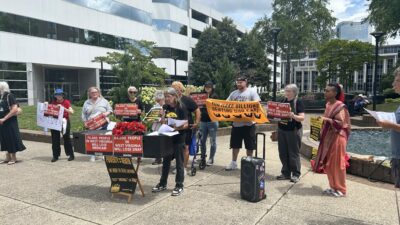Legislation that would extend anti-discrimination protections to LGBTQ+ people across Pennsylvania cleared a critical committee hurdle in the state House on Monday, 22 years after the bill was first introduced.

The bill, which now goes to the House floor for a vote, would simply add sexual orientation and gender identity or expression to the list of protected classes under the Pennsylvania Human Relations Act.
The House Judiciary Committee approved the measure on a party-line vote of 12-9.
The proposal inspired emotional and passionate rhetoric from supporters as Republican members of the committee suggested it would infringe on the religious convictions and freedom of individuals and institutions and lead to unintended consequences.
Following the vote, the bill’s co-prime sponsors, Reps. Malcolm Kenyatta, D-Philadelphia, and Jessica Benham, D-Allegheny, embraced its original sponsor, Rep. Dan Frankel, D-Allegheny embraced.
“Pennsylvania is a better place when it’s fair,” Kenyatta, the first openly gay man of color in the General Assembly, said. “And right now, too many Pennsylvanians can legally be discriminated against because of who they are, because of how they identify in critical aspects of their lives, including housing, including education, and winning public accommodations.”
The legislation would allow people who believe that they have been discriminated against because they are gay, lesbian, bisexual, transexual or queer the ability to file a complaint with the Pennsylvania Human Relations Commission.
Three Pennsylvania counties and 70 municipalities have anti-discrimination ordinances that prohibit discrimination against LGBTQ+ people in employment, housing or public accommodations.
“When I drive to Harrisburg, I drive in and out of localities where my rights are protected, or I am protected and where I am not protected from discrimination,” Benham, the first openly queer woman in the General Assembly, said. “And I know well from personal experience, how terrible the consequences of discrimination can be, not just on individuals but on communities.”
While the bill would only extend existing protection already granted to people on the basis of sex, religion or national origin to LGBTQ+ people, several Republican lawmakers introduced anti-LGBTQ+ themes to the discussion.
Rep. Paul Schemel, R-Franklin, asked whether the legislation would force healthcare providers to provide gender-affirming care such as gender reassignment surgery or puberty- blocking medication to a person who identifies as the opposite sex.
Kenyatta replied that Schemel’s question misapprehended the purpose of the legislation and noted that it has had bipartisan support over the years, including from the Pennsylvania Catholic Conference.
“We’re not doing it for ourselves. We’re doing it for the people in this audience, our constituents in our districts. Those who live in fear every day for being exactly who they are. It is hard to think that any of my colleagues would vote against this bill. But I urge all my colleagues to vote yes. Let’s get this done. We’re long overdue to do what’s right in Pennsylvania.” — Rep. La’Tasha D. Mayes, D-Allegheny
“If you would like to introduce legislation about trans kids, which is this line of questioning, then you introduce that legislation. I promise to be a ‘no’ vote on it. I promise to do everything I can to defeat it, if that ever comes up, but hopefully it will not,” Kenyatta said.
Rep. David Rowe, R-Union, also injected transphobic rhetoric into the debate, suggesting that it would force shelters for women fleeing sexual violence and abusive partners to admit biological men who identify as women.
Judiciary Committee Executive Director Tim Clawges said the legislation simply prohibits discrimination on the basis of membership in a protected class. If a situation arose such as Rowe suggested, it could be the subject of a complaint to the PHRC where it would be adjudicated.
“[The bill] doesn’t make specific provisions for each factual situation,” Clawges said.
In response to Rowe’s line of questions, Rep. Emily Kinkead, D-Allegheny, noted that two-thirds of the members of the Judiciary Committee had never had their basic rights put to a vote in the General Assembly.
“I think that’s telling,” Kinkead said. “We have had to affirmatively vote throughout the history of this country as to who is human and who deserves to be treated as such.
“Now we are having exactly the same debate about our LGBTQI plus friends and neighbors. And how dare we? This absolutely should have been fixed long ago,” Kinkead said, adding that she was angered that women are being used as a shield against equality for transgender people.
Rep. La’Tasha D. Mayes, D-Allegheny, said her colleagues’ concern for women and survivors of sexual and domestic violence is normal.
“What’s not normal is to conflate that with a law that will protect the human and civil rights of LGBTQ-plus folks in this commonwealth,” Mayes said. “If you want to strip trans Pennsylvanians of their health care, just say that. If you want to deny trans youth gender- affirming, life-saving care, just say that.”
The real consequences of continuing to delay a law to protect LGBTQ Pennsylvanians would be more bullying, more violence, more murders and more death by suicide among those who need it.
Mayes said she was proud to co-sponsor the bill with Kenyatta and Benham.
“We’re not doing it for ourselves. We’re doing it for the people in this audience, our constituents in our districts. Those who live in fear every day for being exactly who they are,” Mayes said. “It is hard to think that any of my colleagues would vote against this bill. But I urge all my colleagues to vote yes. Let’s get this done. We’re long overdue to do what’s right in Pennsylvania.”
Peter Hall has been a journalist in Pennsylvania and New Jersey for more than 20 years, most recently covering criminal justice and legal affairs for The Morning Call in Allentown. His career at local newspapers and legal business publications has taken him from school board meetings to the Pennsylvania Supreme Court and many points of interest between. He earned a degree in journalism from Susquehanna University.
The Pennsylvania Capital-Star is a nonpartisan, nonprofit news site dedicated to honest and aggressive coverage of state government, politics and policy. The nearly 13 million people who call the commonwealth home depend on their interests being safeguarded by one of the nation’s largest, most expensive, and often inefficient and corrupt full-time state legislatures. The actions of the legislative, executive and judicial branches touch on almost every aspect of Pennsylvanians’ daily lives.







